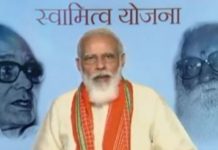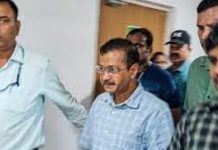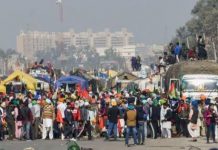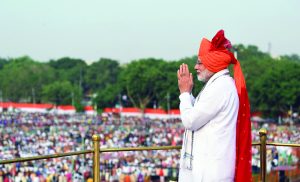
Prime Minister Narendra Modi’s fifth and last speech during his tenure on the 72nd anniversary of Independence Day was meant to be historic in the run-up to the
Lok Sabha elections 2019. Surprisingly, PM Modi’s speech didn’t weave the same magic this time as his deliverance was nothing more than a report card devoted to his governance. He has delivered five Independence Day speeches since 2014. Like every year, PM Modi addressed the countrymen from the ramparts of the Red Fort with a slogan of ‘reform, perform and transform’.
Sharing his vision of collective growth “team India” PM Modi emphasises: “When 125 crore countrymen become partners, then each and every citizen joins us in the progress of the country. When 125 crore dreams, 125 crore resolves, 125 crore efforts, move in the right direction to attain desired goals then nothing is unattainable.”
Besides a number of other aspirations, Modi assured the nation of “doubling the farmers’ income by the 75th year of Independence, housing for all, electrification for all villages, toilets for all, Kasmiriyat,” etc.
Knowing the criticality of 2019 general elections for the NDA, Modi’s speech continued with the attacks on previous government with the mention of “policy paralysis during the UPA rule.”
In 2014 general elections, the BJP under the leadership of Modi was swept to power at the Centre by a majority and formed the government by reviving the NDA. In his maiden speech in 2014, PM Modi presented himself as an “outsider” to power corridors of Delhi and claimed of having brought a fresh perspective and vision.
Corruption, policy paralysis, unemployment, jobless youth, atrocities on Dalits, non-governance, women’s plight. etc, which was his USP during his electoral campaigns before he rode the crest of power, delivered the main highlights of his maiden speech from the Red Fort in 2014, with added emphasis on sanitation.
Nevertheless, Modi’s fifth and last speech of his tenure as PM has failed to set an agenda like 2014 and seemed to be largely bound by the exigencies of the upcoming elections as he tried to give an account of achievements of the past 50 months. The bulk part of speech looked like a report card of his government, touching upon the achievement of flagship programmes laced with unverifiable facts and reiteration of pledges for various segments of the society with the avowed objective of projecting the scenario that his party’s return to power only could ensure redeeming of those pledges.
Having offered more than 120 new schemes, spending more time in foreign visits and addressing more than 426 election rallies in poll-bound states, PM Modi could spend little time in overviewing the sincere implementation of these schemes and evaluating their monitoring. He did not walk the talk on most of the issues. Foreign policy was almost missing from PM Modi’s last Independence Day speech. Bulk part of PM Modi’s speech was a repetition of what he has been saying for the past one year and there was nothing new, and as one expert calls it “appealing rhetoric.”
While dwelling on the issue of rape and the deterrent effect of death penalty and the general importance of the rule of law, there was no reference to recurring incidents of lynching and atrocities on Dalits which have become a major blot on law and order in many states. According to one expert, PM Modi’s repeated emphasis on his so-called “impatience” and “vision of new India” was perhaps designed to send the message that his “return” to power was inevitable to fulfil that vision.
Some of the highlights from Modi’s speech
SPACE MISSION 2022
India has resolved to send manned spacecraft to the space by 2022. India will be the fourth country to do this.
FARMING SECTOR
The government promises of “doubling farmer’s income by 75th year of Independence.” New avenues of organic farming, blue revolution, sweet revolution, solar farming have emerged on which the government plan to move ahead. In fisheries, India has emerged second largest country of the world. The export of honey has doubled. The focus on Solar farming can contribute to agriculture and at the same time earn money by sale of solar energy.
AYUSHMAN BHARAT
10 crore families will get health insurance benefits. Each family will get 5 lakh rupees health coverage annually.
TRIPLE TALAQ
Those who have not faced the Talaq are spending their lives under pressure. “But I want to assure my Muslim mothers, sisters and daughters that I will not stop till they get justice. I will fulfill your aspirations.”
BLACK MONEY
Mobilised 90,000 crore money to the Government Exchequer.
DIGITAL INDIA
Modi said that Digital India is now making inroads into villages. “As a government sensitive to the needs of people, efforts are being made to turn Digital India into a reality.”
GST
On this PM Modi said: “Today, with the help of small traders, their open-mindedness and their attitude of accepting the new, the country has implemented GST. The small entrepreneurs, small businessmen who faced teething difficulties in adopting GST, accepted the challenge and the country is now moving ahead.”
BANKING SECTOR & ECONOMY
NDA government has enacted laws on Insolvency and Bankruptcy to strengthen the banking sector. Benami Property Law has been implemented with great courage and intention for the good of the country.
“There was a time when the world used to call India’s economy risky. However, today, the same people and institutions have been saying with a lot of confidence that our reform momentum has been strengthening our fundamentals.”
EASE OF DOING BUSINESS
Modi said that India has reached the 100th spot in Ease of Doing Business ranking.
POLICY PARALYSIS
There was a time when for the world India meant ‘policy paralysis’ and ‘delayed reforms’. However, today India is being discussed for ‘reform, perform and transform’.
MUDRA LOAN
13 crore people have availed Mudra loan. Of this 4 crore are youth who have availed loan for the very first time and are self-employed.
NORTH-EAST INDIA
The last village of North-East has been electrified recently. Highways, railways, airways, waterways and information ways (i-ways) coming to the region. The work of installing electric transmission lines across the North-East is progressing at a rapid pace.
Youth from the North-East are establishing BPOs in the region. New educational institutions are being set up and the North-East India is becoming the new hub for organic farming. North-East is going to host the Sports University.
J&K
With three basic elements of Insaniyat, Jamhuriyat, Kashmiriyat (humanism, democracy, Kasmiriyat) under the vison of Atal Bihari Vajpayee, the government plans to develop Jammu & Kashmir, including Ladakh or Jammu or Srinagar valley.
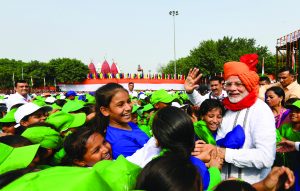
YOUNG INDIA
About 65 per cent of the population in the country is below 35 years of age. Today, our country is talking about Tier 2 and Tier 3 cities and paying attention to the youngsters engaged in modern agriculture in the rural areas. Today the youngsters of the country are taking the nation to greater heights by exploring and engaging in new fields such as Start-ups, BPOs, E-commerce, mobility etc.
Besides, other pertinent subjects that are of national interest like ‘housing for all’, ‘Swachh Bharat Abhiyan’, ‘power for all’, set up of educational intuitions, etc. were part of the highlights in his speech.
Celebrating the Independence Day is a fair idea that should continue with every citizen because it represents collective articulation of citizens’ sense of gratitude for those who sacrificed their lives to fight the mighty British empire, and imagined the possibility of freedom. It also epitomizes our collective gratitude for innumerable unknown heroes, and reminds us to emulate their example to safeguard this hard-won freedom. As one critic has opined, this occasion “reinforces some sort of group solidarity; and this secular ritual is essentially a form of ‘civic religiosity’ a modern nation needs to define itself.”
Weakening of democratic and constitutional institutions along with the fragmentation of the polity, erosion of secular values and rise of cultural nationalism have cumulatively given rise to a lamentable situation. The present state of affairs is afflicted with some disturbing characteristics which are prone to adversely impact social harmony and peace. Assertion of militant Hindutva encourages violence and intolerance in the garb of religion – be it mob lynching or cow vigilantism – and Dalits, marginalized segments and minorities fall an easy prey to such machinations.
Undoubtedly, India at 71 has come a long way; nonetheless, the defining spirit and mode of its governance and administrative structures still reek of sluggishness and ineptness. Opportunism is rife with the political class and the neo-rich class is mired in aggressive consumerism finding more solace in the material symbolic products than showing some concern for the socially deprived or disadvantaged. Most of the narratives handed out to the citizenry over the past seven decades have remained unfulfilled. Failure as well as inability of the ruling dispensation, irrespective of party politics, in delivering on to the citizens what they deserve in return for taxes they contribute to state exchequer, to liberate them from communalism and hatred, provide them a fair law and order ambience to feel secure, provide them decent and affordable healthcare, education and housing is inexcusable. Social justice still remains a far cry. A common citizen is compelled to ask himself, “Main Azaad HooN?”
One is reminded of the prophetic observation of Babasaheb Ambedkar made sixty-nine years ago: “By independence, we have lost the excuse of blaming the British for anything going wrong. If hereafter things go wrong, we will have nobody to blame except ourselves. There is great danger of things going wrong.”
letters@tehelka.com









